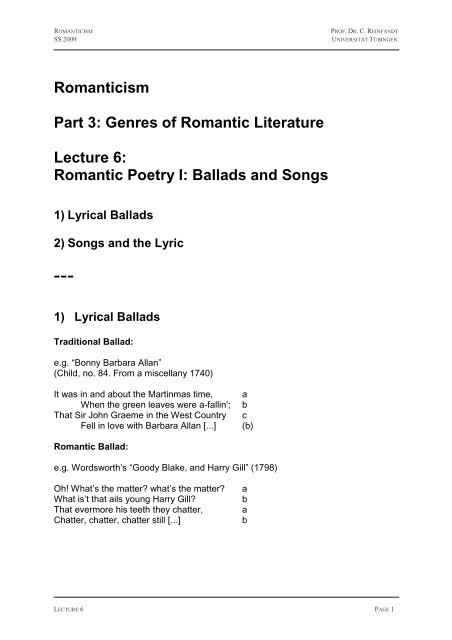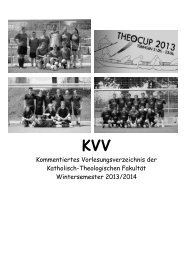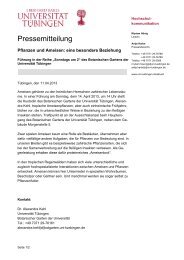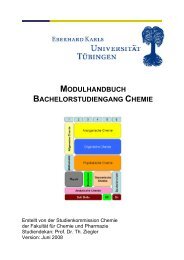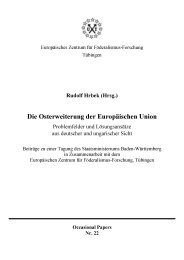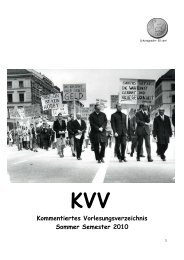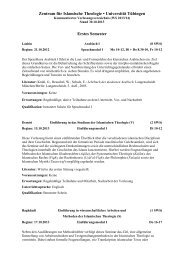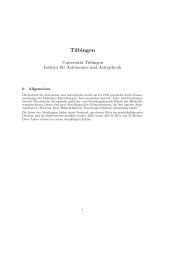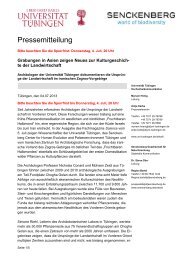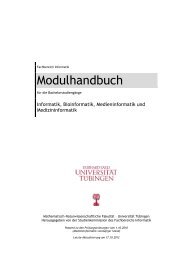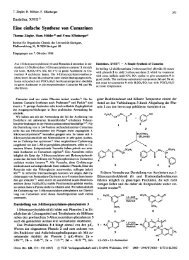Romantic Poetry I: Ballads and Songs - Universität Tübingen
Romantic Poetry I: Ballads and Songs - Universität Tübingen
Romantic Poetry I: Ballads and Songs - Universität Tübingen
Create successful ePaper yourself
Turn your PDF publications into a flip-book with our unique Google optimized e-Paper software.
ROMANTICISM<br />
SS 2009<br />
PROF. DR. C. REINFANDT<br />
UNIVERSITÄT TÜBINGEN<br />
<strong>Romantic</strong>ism<br />
Part 3: Genres of <strong>Romantic</strong> Literature<br />
Lecture 6:<br />
<strong>Romantic</strong> <strong>Poetry</strong> I: <strong>Ballads</strong> <strong>and</strong> <strong>Songs</strong><br />
1) Lyrical <strong>Ballads</strong><br />
2) <strong>Songs</strong> <strong>and</strong> the Lyric<br />
---<br />
1) Lyrical <strong>Ballads</strong><br />
Traditional Ballad:<br />
e.g. “Bonny Barbara Allan”<br />
(Child, no. 84. From a miscellany 1740)<br />
It was in <strong>and</strong> about the Martinmas time,<br />
When the green leaves were a-fallin';<br />
That Sir John Graeme in the West Country<br />
Fell in love with Barbara Allan [...]<br />
a<br />
b<br />
c<br />
(b)<br />
<strong>Romantic</strong> Ballad:<br />
e.g. Wordsworth’s “Goody Blake, <strong>and</strong> Harry Gill” (1798)<br />
Oh! What’s the matter what’s the matter<br />
What is’t that ails young Harry Gill<br />
That evermore his teeth they chatter,<br />
Chatter, chatter, chatter still [...]<br />
a<br />
b<br />
a<br />
b<br />
LECTURE 6 PAGE 1
ROMANTICISM<br />
SS 2009<br />
PROF. DR. C. REINFANDT<br />
UNIVERSITÄT TÜBINGEN<br />
Erasmus Darwin, Zoonomia, or the Laws of Organic Life (1794-96)<br />
I received good information of the truth of the following case, which was published a<br />
few years ago in the newspapers. A young farmer in Warwick-shire, finding his<br />
hedges broke, <strong>and</strong> the sticks carried away during a frosty season, determined to<br />
watch for the thief. He lay many cold hours under a hay-stack, <strong>and</strong> at length an old<br />
woman, like a witch in a play, approached, <strong>and</strong> began to pull up the hedge; he waited<br />
till she had tied up her bottle of sticks, <strong>and</strong> was carrying them of, that he might<br />
convict her of the theft, <strong>and</strong> then springing from his concealment, he seized his prey<br />
with violent threats. After some altercation, in which her load was left upon the<br />
ground, she kneeled upon her bottle of sticks, <strong>and</strong> raising her arms to Heaven<br />
beneath the bright moon then at the full, spoke to the farmer already shivering with<br />
cold, “Heaven grant, that thou never mayest know again the blessing to be warm.”<br />
He complained of cold all the next day, <strong>and</strong> wore an upper coat, an in a few days<br />
another, <strong>and</strong> in a fortnight took to his bed, always saying nothing made him warm, he<br />
covered himself with very many blankets, <strong>and</strong> had a sieve over his face, as he lay;<br />
<strong>and</strong> from this one insane idea he kept his bed above twenty years for fear of the cold<br />
air, till at length he died.<br />
‘Advertisment’ prefaced to Lyrical <strong>Ballads</strong> 1798<br />
The tale of Goody Blake <strong>and</strong> Harry Gill is founded on a well-authenticated fact which<br />
happened in Warwickshire.<br />
‘Preface’ to the Lyrical <strong>Ballads</strong> 1800<br />
[F]ew persons will deny, that of two descriptions either of passions, manners or<br />
characters, each of them equally well executed, the one in prose <strong>and</strong> the other in<br />
verse, the verse will be read a hundred times where the prose is read once [...] In<br />
consequence of these convictions I related in metre the Tale of GOODY BLAKE <strong>and</strong><br />
HARRY GILL, which is one of the rudest of this collection. And I have the satisfaction<br />
of knowing that it has been communicated to many hundreds of people who would<br />
never have heard of it, had it not been narrated as a ballad, <strong>and</strong> in a more impressive<br />
metre than is usual in ballads.<br />
LECTURE 6 PAGE 2
ROMANTICISM<br />
SS 2009<br />
PROF. DR. C. REINFANDT<br />
UNIVERSITÄT TÜBINGEN<br />
William Wordsworth, Goody Blake <strong>and</strong> Harry Gill: A True Story<br />
Oh! what's the matter what's the matter<br />
What is 't that ails young Harry Gill<br />
That evermore his teeth they chatter,<br />
Chatter, chatter, chatter still!<br />
Of waistcoats Harry has no lack,<br />
Good duffle grey, <strong>and</strong> flannel fine;<br />
He has a blanket on his back,<br />
And coats enough to smother nine.<br />
In March, December, <strong>and</strong> in July,<br />
'Tis all the same with Harry Gill;<br />
The neighbours tell, <strong>and</strong> tell you truly,<br />
His teeth they chatter, chatter still.<br />
At night, at morning, <strong>and</strong> at noon,<br />
'Tis all the same with Harry Gill;<br />
Beneath the sun, beneath the moon,<br />
His teeth they chatter, chatter still!<br />
Young Harry was a lusty drover,<br />
And who so stout of limb as he<br />
His cheeks were red as ruddy clover;<br />
His voice was like the voice of three.<br />
Old Goody Blake was old <strong>and</strong> poor;<br />
I'll fed she was, <strong>and</strong> thinly clad;<br />
And any man who passed her door<br />
Might see how poor a hut she had.<br />
All day she spun in her poor dwelling:<br />
And then her three hours' work at night,<br />
Alas! 'twas hardly worth the telling,<br />
It would not pay for c<strong>and</strong>le-light.<br />
Remote from sheltered village-green,<br />
On a hill's northern side she dwelt,<br />
Where from sea-blasts the hawthorns lean,<br />
And hoary dews are slow to melt.<br />
By the same fire to boil their pottage,<br />
Two poor old Dames, as I have known,<br />
Will often live in one small cottage;<br />
But she, poor Woman! housed alone.<br />
'Twas well enough, when summer came,<br />
The long, warm, lightsome summer-day,<br />
Then at her door the canty Dame<br />
Would sit, as any linnet, gay.<br />
LECTURE 6 PAGE 3
ROMANTICISM<br />
SS 2009<br />
PROF. DR. C. REINFANDT<br />
UNIVERSITÄT TÜBINGEN<br />
But when the ice our streams did fetter,<br />
Oh then how her old bones would shake!<br />
You would have said, if you had met her,<br />
'Twas a hard time for Goody Blake.<br />
Her evenings then were dull <strong>and</strong> dead:<br />
Sad case it was, as you may think,<br />
For very cold to go to bed;<br />
And then for cold not sleep a wink.<br />
O joy for her! whene'er in winter<br />
The winds at night had made a rout;<br />
And scattered many a lusty splinter<br />
And many a rotten bough about.<br />
Yet never had she, well or sick,<br />
As every man who knew her says,<br />
A pile beforeh<strong>and</strong>, turf or stick,<br />
Enough to warm her for three days.<br />
Now, when the frost was past enduring,<br />
And made her poor old bones to ache,<br />
Could any thing be more alluring<br />
Than an old hedge to Goody Blake<br />
And, now <strong>and</strong> then, it must be said,<br />
When her old bones were cold <strong>and</strong> chill,<br />
She left her fire, or left her bed,<br />
To seek the hedge of Harry Gill.<br />
Now Harry he had long suspected<br />
This trespass of old Goody Blake;<br />
And vowed that she should be detected -<br />
That he on her would vengeance take.<br />
And oft from his warm fire he'd go,<br />
And to the fields his road would take;<br />
And there, at night, in frost <strong>and</strong> snow,<br />
He watched to seize old Goody Blake.<br />
And once, behind a rick of barley,<br />
Thus looking out did Harry st<strong>and</strong>:<br />
The moon was full <strong>and</strong> shining clearly,<br />
And crisp with frost the stubble l<strong>and</strong>.<br />
- He hears a noise - he's all awake -<br />
Again - on tip-toe down the hill<br />
He softly creeps - 'tis Goody Blake;<br />
She's at the hedge of Harry Gill!<br />
LECTURE 6 PAGE 4
ROMANTICISM<br />
SS 2009<br />
PROF. DR. C. REINFANDT<br />
UNIVERSITÄT TÜBINGEN<br />
Right glad was he when he beheld her:<br />
Stick after stick did Goody pull:<br />
He stood behind a bush of elder,<br />
Till she had filled her apron full.<br />
When with her load she turned about,<br />
The by-way back again to take;<br />
He started forward, with a shout,<br />
And sprang upon poor Goody Blake.<br />
And fiercely by the arm he took her,<br />
And by the arm he held her fast,<br />
And fiercely by the arm he shook her,<br />
And cried, »I've caught you then at last!«<br />
Then Goody, who had nothing said,<br />
Her bundle from her lap let fall;<br />
And, kneeling on the sticks, she prayed<br />
To God that is the judge of all.<br />
She prayed, her withered h<strong>and</strong> uprearing,<br />
While Harry held her by the arm -<br />
»God! who art never out of hearing,<br />
O may he never more be warm!«<br />
The cold, cold moon above her head,<br />
Thus on her knees did Goody pray;<br />
Young Harry heard what she had said:<br />
And icy cold he turned away.<br />
He went complaining all the morrow<br />
That he was cold <strong>and</strong> very chill:<br />
His face was gloom, his heart was sorrow,<br />
Alas! that day for Harry Gill!<br />
That day he wore a riding-coat,<br />
But not a whit the warmer he:<br />
Another was on Thursday brought,<br />
And ere the Sabbath he had three.<br />
'Twas all in vain, a useless matter,<br />
And blankets were about him pinned;<br />
Yet still his jaws <strong>and</strong> teeth they clatter,<br />
Like a loose casement in the wind.<br />
And Harry's flesh it fell away;<br />
And all who see him say, 'tis plain,<br />
That, live as long as live he may,<br />
He never will be warm again.<br />
LECTURE 6 PAGE 5
ROMANTICISM<br />
SS 2009<br />
PROF. DR. C. REINFANDT<br />
UNIVERSITÄT TÜBINGEN<br />
No word to any man he utters,<br />
A-bed or up, to young or old;<br />
But ever to himself he mutters,<br />
»Poor Harry Gill is very cold.«<br />
A-bed or up, by night or day;<br />
His teeth they chatter, chatter still.<br />
Now think, ye farmers all, I pray,<br />
Of Goody Blake <strong>and</strong> Harry Gill!<br />
Samuel Taylor Coleridge<br />
The Rime of the Ancyent Marinere<br />
In seven parts<br />
Argument<br />
How a Ship having passed the Line was driven by Storms to the cold Country<br />
towards the South Pole; <strong>and</strong> how from thence she made her course to the Tropical<br />
Latitude of the Great Pacific Ocean; <strong>and</strong> of the strange things that befell; <strong>and</strong> in what<br />
manner the Ancyent Marinere came back to his own Country.<br />
I<br />
It is an ancyent Marinere,<br />
And he stoppeth one of three:<br />
»By thy long grey beard <strong>and</strong> thy glittering eye<br />
Now wherefore stoppest me<br />
The Bridegroom's doors are open'd wide,<br />
And I am next of kin;<br />
The Guests are met, the Feast is set, -<br />
May'st hear the merry din.«<br />
But still he holds the wedding-guest -<br />
There was a Ship, quoth he -<br />
»Nay, if thou'st got a laughsome tale,<br />
Marinere! come with me.«<br />
LECTURE 6 PAGE 6
ROMANTICISM<br />
SS 2009<br />
PROF. DR. C. REINFANDT<br />
UNIVERSITÄT TÜBINGEN<br />
He holds him with his skinny h<strong>and</strong>,<br />
Quoth he, there was a Ship -<br />
»Now get thee hence, thou grey-beard Loon!<br />
Or my Staff shall make thee skip.«<br />
He holds him with his glittering eye -<br />
The wedding guest stood still<br />
And listens like a three year's child;<br />
The Marinere hath his will.<br />
The wedding-guest sate on a stone,<br />
He cannot chuse but hear:<br />
And thus spake on that ancyent man,<br />
The bright-eyed Marinere.<br />
The Ship was cheer'd, the Harbour clear'd -<br />
Merrily did we drop<br />
Below the Kirk, below the Hill,<br />
Below the Light-house top.<br />
The Sun came up upon the left,<br />
Out of the Sea came he:<br />
And he shone bright, <strong>and</strong> on the right<br />
Went down into the Sea.<br />
Higher <strong>and</strong> higher every day,<br />
Till over the mast at noon –<br />
The wedding-guest here beat his breast,<br />
For he heard the loud bassoon.<br />
The Bride hath pac'd into the Hall,<br />
Red as a rose is she;<br />
Nodding their heads before her goes<br />
The merry Minstralsy.<br />
The wedding-guest he beat his breast,<br />
Yet he cannot chuse but hear:<br />
And thus spake on that ancyent Man,<br />
The bright-eyed Marinere.<br />
Listen, Stranger! Storm <strong>and</strong> Wind,<br />
A Wind <strong>and</strong> Tempest strong!<br />
For days <strong>and</strong> weeks it play'd us freaks -<br />
Like Chaff we drove along.<br />
LECTURE 6 PAGE 7
ROMANTICISM<br />
SS 2009<br />
PROF. DR. C. REINFANDT<br />
UNIVERSITÄT TÜBINGEN<br />
Listen, Stranger! Mist <strong>and</strong> Snow,<br />
And it grew wond'rous cauld:<br />
And Ice mast-high came floating by<br />
As green as Emerauld.<br />
And thro' the drifts the snowy clifts<br />
Did send a dismal sheen;<br />
Ne shapes of men ne beasts we ken -<br />
The Ice was all between.<br />
The Ice was here, the Ice was there,<br />
The Ice was all around:<br />
It crack'd <strong>and</strong> growl'd, <strong>and</strong> roar'd <strong>and</strong> howl'd -<br />
Like noises of a swound.<br />
At length did cross an Albatross,<br />
Thorough the Fog it came;<br />
And an it were a Christian Soul,<br />
We hail'd it in God's name.<br />
The Marineres gave it biscuit-worms,<br />
And round <strong>and</strong> round it flew:<br />
The Ice did split with a Thunder-fit,<br />
The Helmsman steer'd us thro'.<br />
And a good south wind sprung up behind,<br />
The Albatross did follow;<br />
And every day for food or play<br />
Came to the Marinere's hollo!<br />
In mist or cloud on mast or shroud,<br />
It perch'd for vespers nine,<br />
Whiles all the night thro' fog-smoke white,<br />
Glimmer'd the white moon-shine.<br />
»God save thee, ancyent Marinere!<br />
From the fiends that plague thee thus -<br />
Why look'st thou so« - with my cross bow<br />
I shot the Albatross.<br />
LECTURE 6 PAGE 8
ROMANTICISM<br />
SS 2009<br />
PROF. DR. C. REINFANDT<br />
UNIVERSITÄT TÜBINGEN<br />
Victorian Ballad:<br />
e.g. Tennyson’s “The Lady of Shalott” (1832/42)<br />
On either side the river lie<br />
a<br />
Long fields of barley <strong>and</strong> of rye,<br />
a<br />
That clothe the wold <strong>and</strong> meet the sky;<br />
a<br />
And through the field the road runs by<br />
a<br />
To many-towered Camelot;<br />
b<br />
The yellowleaved waterlily And up <strong>and</strong> down the people go c<br />
The greensheathed daffodilly, Gazing where the lilies blow c<br />
Tremble in the water chilly, Round an isl<strong>and</strong> there below, c<br />
Round about Shalott. The isl<strong>and</strong> of Shalott. b<br />
Alfred Lord Tennyson, “The Lady of Shalott”: Endings<br />
1832:<br />
They crossed themselves, their stars they blest,<br />
Knight, minstrel, abbot, squire <strong>and</strong> guest.<br />
There lay a parchment on her breast,<br />
That puzzled more than all the rest,<br />
The wellfed wits at Camelot.<br />
‘The web was woven curiously<br />
The charm is broken utterly,<br />
Draw near <strong>and</strong> fear not - this is I,<br />
The Lady of Shalott.’<br />
1842:<br />
Who is this <strong>and</strong> what is here<br />
And in the lighted palace near<br />
Died the sound of royal cheer;<br />
And they crossed themselves for fear,<br />
All the knights at Camelot.<br />
But Lancelot mused a little space;<br />
He said, 'She has a lovely face;<br />
God in his mercy lend her grace,<br />
The Lady of Shalott.'<br />
LECTURE 6 PAGE 9
ROMANTICISM<br />
SS 2009<br />
PROF. DR. C. REINFANDT<br />
UNIVERSITÄT TÜBINGEN<br />
2) <strong>Songs</strong> <strong>and</strong> the Lyric<br />
From a welter of shorter poetic genres, lyric gradually emerged [in the Renaissance]<br />
as the most common catchall category, <strong>and</strong> only in the nineteenth <strong>and</strong> twentieth<br />
century was it mythologized as the purest <strong>and</strong> oldest of poetic genres <strong>and</strong> thus<br />
transformed into a nostalgic ideology marker [...]<br />
But lyric did not conquer poetry: poetry was reduced to lyric. Lyric became the<br />
dominant form of poetry only as poetry’s authority was reduced to the cramped<br />
margins of culture [...] <strong>Poetry</strong> was pushed into a lyric ghetto because prose fiction<br />
became the presumptive vehicle for narrative literature.<br />
(Jeffreys 1995, 197/200)<br />
Key terms:<br />
subjectivity/individuality, immediacy, authenticity, organicism<br />
► narrative recounts an event, lyric poetry strives to be an event.<br />
William Wordsworth:<br />
Some of these pieces are essentially lyrical; <strong>and</strong>, therefore, cannot have their due<br />
force without a supposed musical accompaniment; but, in much the greatest part, as<br />
a substitute for the classic lyre or romantic harp, I require nothing more than an<br />
animated or impassioned recitation, adapted to the subject. Poems, however humble<br />
in their kind, if they be good in that kind, cannot read themselves; the law of long<br />
syllable <strong>and</strong> short must not be so inflexible, – the letter of metre must not be so<br />
impassive to the spirit of versification, – as to deprive the Reader of all voluntary<br />
power to modulate, in subordination to the sense, the music of the poem; – in the<br />
same manner as his mind is left at liberty, <strong>and</strong> even summoned, to act upon its<br />
thoughts <strong>and</strong> images. But, though the accompaniment of a musical instrument be<br />
frequently dispensed with, the true Poet does not therefore ab<strong>and</strong>on his privilege<br />
distinct from that of the mere Proseman;<br />
He murmurs near the running brooks<br />
A music sweeter than their own.<br />
(Preface to Poems 1815, emphasis added)<br />
LECTURE 6 PAGE 10
ROMANTICISM<br />
SS 2009<br />
PROF. DR. C. REINFANDT<br />
UNIVERSITÄT TÜBINGEN<br />
I w<strong>and</strong>ered lonely as a cloud<br />
That floats on high o'er vales <strong>and</strong> hills,<br />
When all at once I saw a crowd,<br />
A host, of golden daffodils;<br />
Beside the lake, beneath the trees,<br />
Fluttering <strong>and</strong> dancing in the breeze.<br />
Continuous as the stars that shine<br />
And twinkle on the milky way,<br />
They stretched in never-ending line<br />
Along the margin of a bay:<br />
Ten thous<strong>and</strong> saw I at a glance,<br />
Tossing their heads in sprightly dance.<br />
The waves beside them danced; but they<br />
Out-did the sparkling waves in glee:<br />
A poet could not but be gay,<br />
In such a jocund company:<br />
I gazed - <strong>and</strong> gazed - but little thought<br />
What wealth the show to me had brought:<br />
For oft, when on my couch I lie<br />
In vacant or in pensive mood,<br />
They flash upon that inward eye<br />
Which is the bliss of solitude;<br />
And then my heart with pleasure fills,<br />
And dances with the daffodils. (1804; 1807)<br />
I travelled among unknown men,<br />
In l<strong>and</strong>s beyond the sea;<br />
Nor, Engl<strong>and</strong>! did I know till then<br />
What love I bore to thee.<br />
'Tis past, that melancholy dream!<br />
Nor will I quit thy shore<br />
A second time; for still I seem<br />
To love thee more <strong>and</strong> more.<br />
Among thy mountains did I feel<br />
The joy of my desire;<br />
And she I cherished turned her wheel<br />
Beside an English fire.<br />
Thy mornings showed, thy nights concealed,<br />
The bowers where Lucy played;<br />
And thine too is the last green field<br />
That Lucy's eyes surveyed. (1801; 1807)<br />
LECTURE 6 PAGE 11
ROMANTICISM<br />
SS 2009<br />
PROF. DR. C. REINFANDT<br />
UNIVERSITÄT TÜBINGEN<br />
She dwelt among the untrodden ways<br />
Beside the springs of Dove,<br />
A Maid whom there were none to praise<br />
And very few to love:<br />
A violet by a mossy stone<br />
Half hidden from the eye!<br />
- Fair as a star, when only one<br />
Is shining in the sky.<br />
She lived unknown, <strong>and</strong> few could know<br />
When Lucy ceased to be;<br />
But she is in her grave, <strong>and</strong>, oh,<br />
The difference to me! (1798; 1800)<br />
A slumber did my spirit seal;<br />
I had no human fears:<br />
She seemed a thing that could not feel<br />
The touch of earthly years.<br />
No motion has she now, no force;<br />
She neither hears nor sees;<br />
Rolled round in earth's diurnal course,<br />
With rocks, <strong>and</strong> stones, <strong>and</strong> trees. (1798; 1800)<br />
George Gordon, Lord Byron:<br />
Stanzas for Music<br />
I.<br />
They say that Hope is happiness;<br />
But genuine Love must prize the past,<br />
And Memory wakes the thoughts that bless:<br />
They rose the first - they set the last;<br />
II.<br />
And all that Memory loves the most<br />
Was once our only Hope to be,<br />
And all that Hope adored <strong>and</strong> lost<br />
Hath melted into Memory.<br />
III.<br />
Alas! it is delusion all:<br />
The future cheats us from afar,<br />
Nor can we be what we recall,<br />
Nor dare we think on what we are. (1816; 1829)<br />
LECTURE 6 PAGE 12
ROMANTICISM<br />
SS 2009<br />
PROF. DR. C. REINFANDT<br />
UNIVERSITÄT TÜBINGEN<br />
Percy Bysshe Shelley:<br />
A Song: “Men of Engl<strong>and</strong>”<br />
Men of Engl<strong>and</strong>, wherefore plough<br />
For the lords who lay ye low<br />
Wherefore weave with toil <strong>and</strong> care<br />
The rich robes your tyrants wear<br />
Wherefore feed, <strong>and</strong> clothe, <strong>and</strong> save,<br />
From the cradle to the grave,<br />
Those ungrateful drones who would<br />
Drain your sweat - nay, drink your blood<br />
Wherefore, Bees of Engl<strong>and</strong>, forge<br />
Many a weapon, chain, <strong>and</strong> scourge,<br />
That these stingless drones may spoil<br />
The forced produce of your toil<br />
Have ye leisure, comfort, calm,<br />
Shelter, food, love's gentle balm<br />
Or what is it ye buy so dear<br />
With your pain <strong>and</strong> with your fear<br />
The seed ye sow, another reaps;<br />
The wealth ye find, another keeps;<br />
The robes ye weave, another wears;<br />
The arms ye forge, another bears.<br />
Sow seed, - but let no tyrant reap;<br />
Find wealth, - let no impostor heap;<br />
Weave robes, - let not the idle wear;<br />
Forge arms, - in your defence to bear.<br />
Shrink to your cellars, holes, <strong>and</strong> cells;<br />
In halls ye deck another dwells.<br />
Why shake the chains ye wrought Ye see<br />
The steel ye tempered glance on ye.<br />
With plough <strong>and</strong> spade, <strong>and</strong> hoe <strong>and</strong> loom,<br />
Trace your grave, <strong>and</strong> build your tomb,<br />
And weave your winding-sheet, till fair<br />
Engl<strong>and</strong> be your sepulchre. (1819; 1839)<br />
LECTURE 6 PAGE 13
ROMANTICISM<br />
SS 2009<br />
PROF. DR. C. REINFANDT<br />
UNIVERSITÄT TÜBINGEN<br />
Bibliography Lecture 6:<br />
Curran, Stuart, Poetic Form <strong>and</strong> British <strong>Romantic</strong>ism. New York/Oxford: Oxford UP,<br />
1986.<br />
Jeffreys, Mark, “Ideologies of Lyric: A Problem of Genre in Contemporary Poetics.”<br />
PMLA 110.2 (1995): 196-205.<br />
Mueller-Zettelmann, Eva & Margarete Rubik, eds., Theory into <strong>Poetry</strong>: New<br />
Approaches to the Lyric. Amsterdam/New York: Rodopi, 2005.<br />
Pointner, Frank Erik, “‘Comic Relief’: Hunt Emerson’s The Rime of the Ancient<br />
Mariner.” In: Lars Eckstein, Christoph Reinf<strong>and</strong>t, eds., <strong>Romantic</strong>ism Today. Trier:<br />
WVT, 2009: 205-214.<br />
Reinf<strong>and</strong>t, Christoph, “The Evolution of <strong>Romantic</strong>ism: High Art vs. Popular Culture in<br />
Tennyson’s ‘The Lady of Shalott’”. In: Fritz-Wilhelm Neumann, Sabine Schülting,<br />
eds., Anglistentag 1998 Erfurt: Proceedings. Trier: WVT, 1999: 307-325.<br />
Reinf<strong>and</strong>t, Christoph, Englische Romantik: Eine Einführung. Berlin: E. Schmidt, 2008:<br />
73-102.<br />
LECTURE 6 PAGE 14


